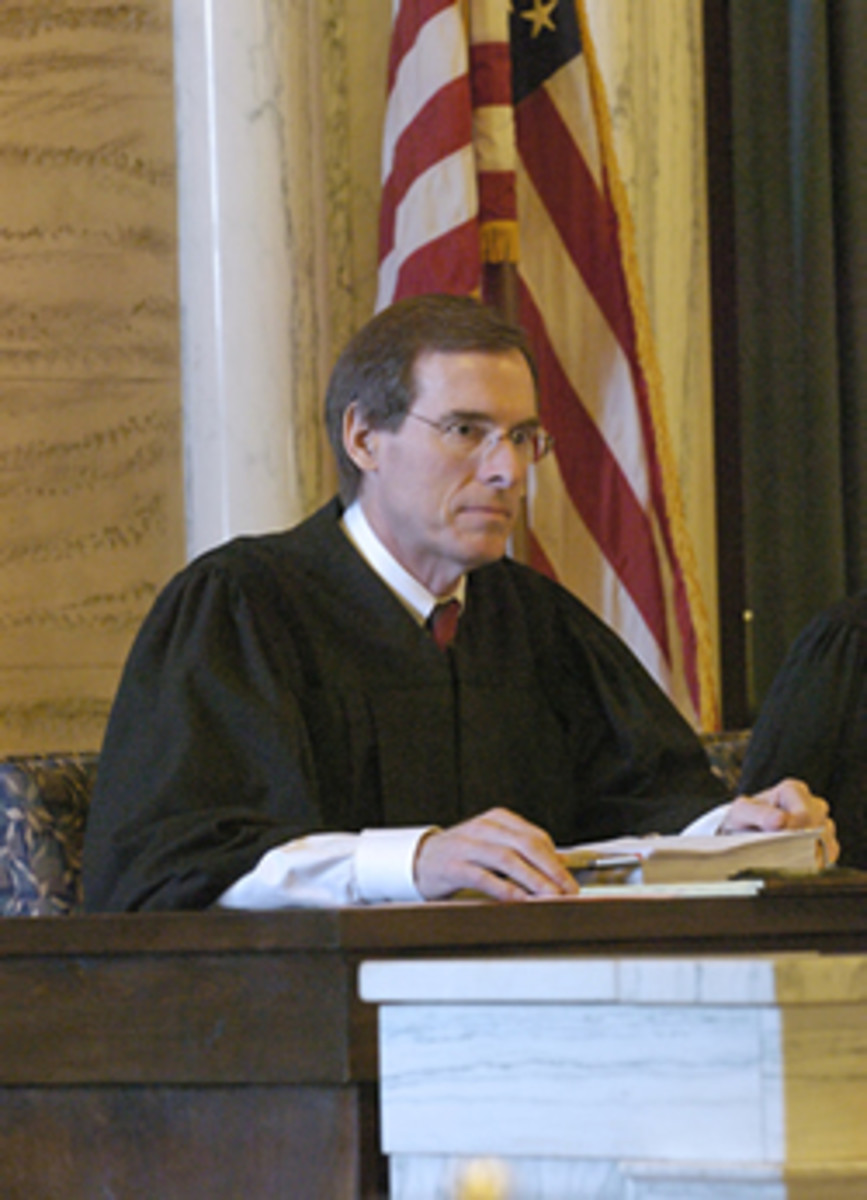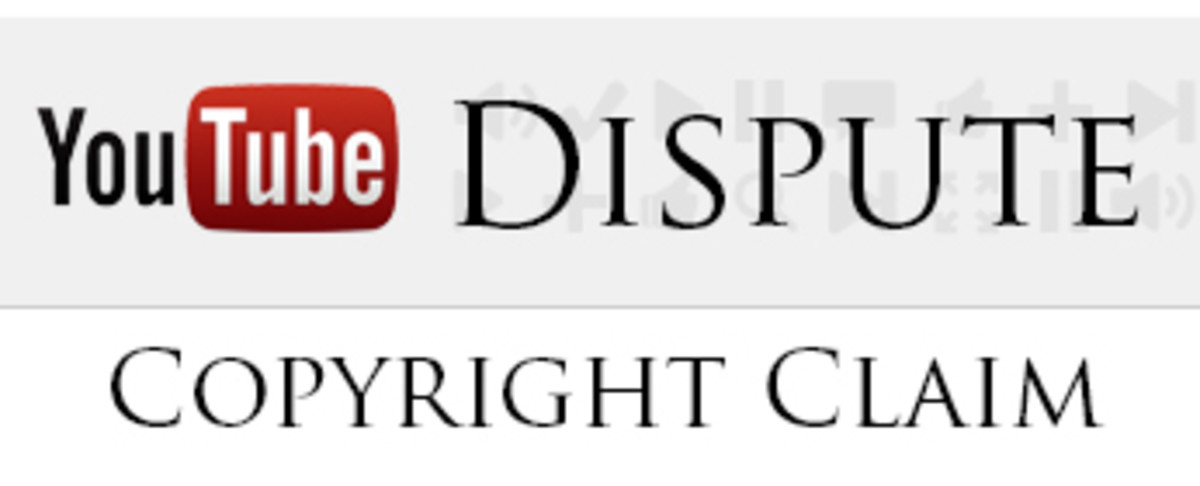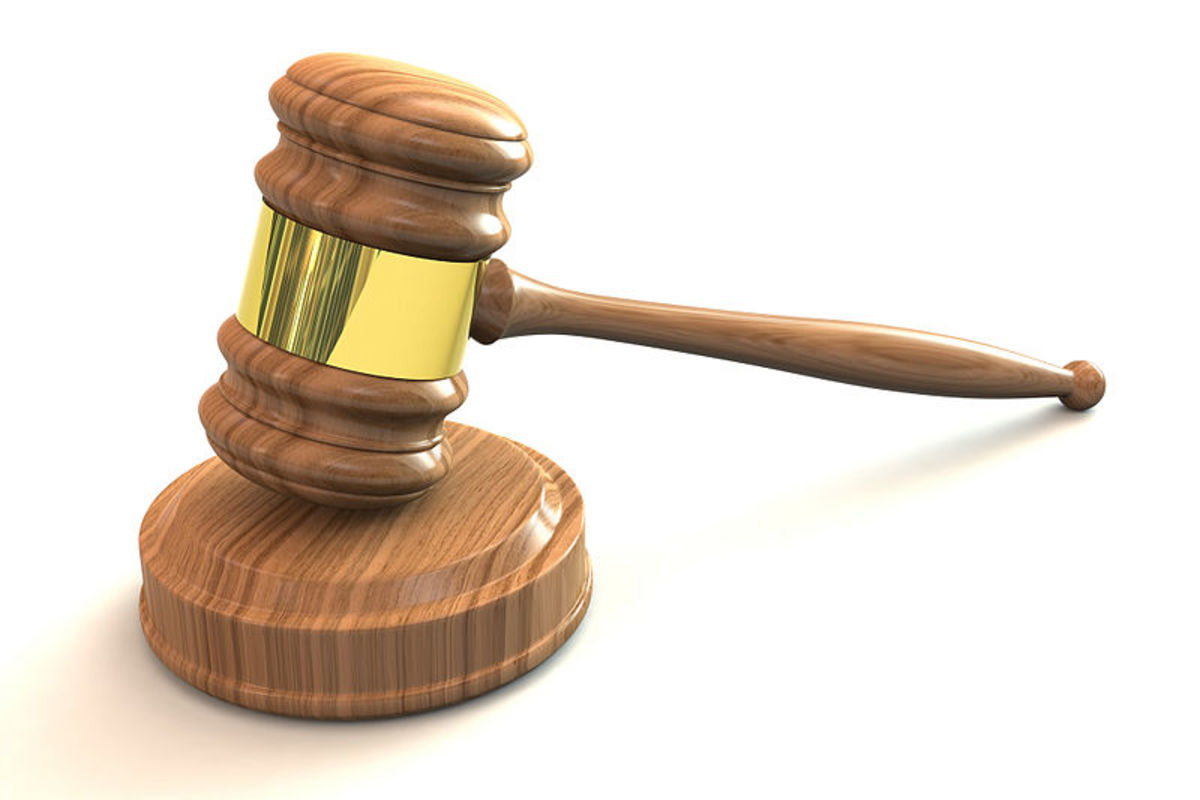You Are The Jury Case of Lenz vs Universal Music Group (Dancing Baby YouTube)
Welcome To The Interactive Jury
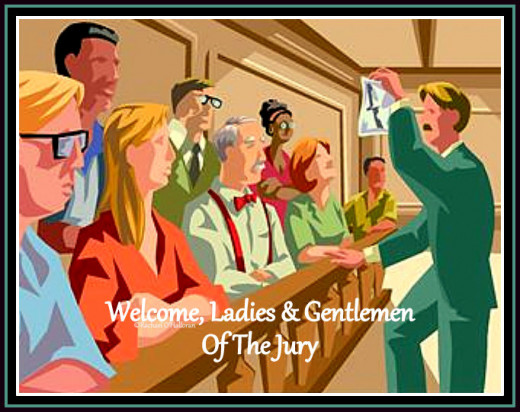
Lenz's YouTube Video
Case 2. DMCA Takedown Notice Alleging Copyright Infringement Via YouTube
I hope you enjoyed the first case in my new "Interactive Jury" hubs featuring real court cases where you get to be an armchair juror. Exercise your First Amendment rights to voice your opinion using the polls and comments in this hub.
Today's featured case is not settled as of April 30, 2014 so your comments may be noticed by the parties involved. However, that should not deter you from voicing them in polls or commenting with your views and opinions on the matter.
This case involves a YouTube video that was taken down after a DMCA complaint was filed citing copyright infringement. It is unique because it involves a home video with copyrighted music playing in the background, which is the basis of this case.
Lenz vs. Universal Music Group (UMG)
Your Recourse To DMCA Takedown Notices
If a host website (in this case the host is YouTube) receives an allegation of copyright infringement, federal copyright law says that any party just making the allegation is enough to warrant the removal of the content from the internet. In this respect, YouTube acts within the law when they remove videos.
Most people accused of copyright infringement usually just accept the DMCA notice that their content was removed, did indeed infringe on someone's copyright. and they can't do anything about it. They let the matter rest.
However, the accusing party is not the deciding factor nor does it have to be the end of the matter.
What many people accused of infringement do not investigate and learn is that they do have some recourse - if they want to keep their content online.
By filing a counter-notice contesting the takedown, the host website now has to put the infringing content back online within 14 business days.
When the matter is evaluated by the host or if the matter goes to court and is litigated, then the host is notified of the findings and acts according to their Terms of Service or the pronouncement of court judgment. Their decision is final (whether to upload or take down the video) and the only way it does not remain final is if one party takes the other party back to court to re-litigate the matter (appeal).
When Does Safe Harbor Apply?
The Digital Millennium Copyright Act protects internet service providers from the consequences of all their users' actions, or for storing or transmitting infringing material.
This safe harbor applies only if the online company (including agent or host) does not reasonably know or should not reasonably have known about the infringement; and once the online company learns about the infringement, it must act “expeditiously” to remove the infringing material
The Facts - February 2007 to June 2007
LENZ
On February 7, 2007, Stephanie Lenz, a wife and mother from a rural town in Pennsylvania, used her digital camera to create a 29-second video of her 18 month old son Holden dancing to the music of "Let's Go Crazy" performed by the artist Prince. This was a CD she purchased and played on a nearby CD player.
The video shows her son dancing to the music of Prince's "Let's Go Crazy" music, which is playing very distantly in the background. After viewing the video (shown at the top of this hub), I don't know about you, but I could barely hear or decipher the music. Someone must have been sitting for a long time using special equipment to sift out all the extraneous sounds in order to determine that it was actually Prince's music playing in the video. (Just my two cents worth.)
After recording her son dancing to the music, she transferred it to her computer and on February 8, 2007 she uploaded it to her YouTube channel for her friends and family to enjoy. In all documents, the video is referred to as the Holden Dance Video.
Four months later in June 2007, Lenz received an e-mail from YouTube telling her that due to a claim of copyright infringement, they removed her video from their site at the request of Universal Music Group, warning her that any future copyright infringements would result in YouTube canceling her account and deleting all her remaining videos. At the time of takedown, there were about 30 views on the visitor counter. Today it has 1,298,000. One can't help but wonder if publicity drove up the counter.
Ms. Lenz did not use Google Adsense for advertisements, did not pay YouTube for hosting service and did not receive any monetary gain from visitors viewing her videos. (This is important information for future lawsuits, so keep it in mind.)
~*~ ~*~ ~*~ ~*~ ~*~ ~*~ ~*~ ~*~
UNIVERSAL MUSIC GROUP
Around June 4, 2007, Universal Music Group used the Digital Millennium Copyright Act's (DMCA) takedown process demanding that YouTube remove Lenz's dance video from YouTube because it allegedly infringed on a copyright owned by the artist Prince, whom they represented.
As part of the online form, anyone filing DMCA complaint affirms that under penalty of perjury that their notice of infringement is accurate and that they are authorized to make the infringement claim in the documents. Universal Music Group stated they are the agent representing the artist Prince for his song "Let's Go Crazy."
In a statement to news media, Universal claims they did not file the DMCA notice on their own but did so at the request of the artist Prince, who was very hands on in this takedown filing. Universal refused an interview with ABC News who followed this case closely. Instead they released this statement:
"Prince believes it is wrong for YouTube, or any user-generated site, to appropriate his music without his consent. That position has nothing to do with any particular video that uses his songs. It's simply a matter of principle. And legally, he has the right to have his music removed. We support him and this important principle. That is why, over the last few months, we have asked YouTube to remove thousands of different videos that use Prince music without his permission."
Prince asked for many other videos to be removed the same day he asked for Lenz's video to be taken down. News reports following this case speculate that Prince spends a lot of time online looking for websites, videos and users who infringe on his copyrights by playing his music on their work.
Court documents state that he did not investigate to see if any usage might have been Fair Use; he only knows it is his music being played without his permission. This is a big issue which will be revisited throughout this article.
Universal said even if it was Fair Use, it violated Prince's copyright, which doesn't even make sense. It is either Fair Use or Copyright Infringement, not both.
Copyright Infringement?
Should a home video with music playing in the background be accused of copyright infringement?
Lenz Interview In 2007
Lenz gave an interview to ABC News in October 2007. This is a direct quote from part of the ABC News article:
"All of my [YouTube] videos are home videos, so I thought it was some kind of scam,'' Lenz told ABC News' Law & Justice Unit. When she realized YouTube had actually taken her video down, she said she was shocked.
"At first it frightened me, because I saw who had filed'' the takedown notice, she said.
"It was Universal Music Publishing Group, and I was afraid that ... they might come after me. ... And the more afraid I got, the angrier I got. ... I was afraid that the recording industry might come after me the way they've come after other people for downloading music or file sharing.
"I thought even though I didn't do anything wrong that they might want to file some kind of suit against me, take my house, come after me.
"And I didn't like feeling afraid,'' she continued. "I didn't like feeling that I could get in trouble for something as simple as posting a home video for my friends and family to see."
2007 - Lenz's Reaction To Takedown Notice
When Lenz received the YouTube notice of infringement, she initially thought it was a scam because she had only uploaded home videos - her own original content meant for her friends and family members to see her kids do cute stuff.
Lenz didn't know what to do and she did not know what her rights were, so she contacted a cyber-rights legal organization called the Electronic Frontier Foundation (EFF).
They advised her to file a DMCA counter-notice, which they did on her behalf, acting as her legal counsel.
In her June 27, 2007 counter-notice, her attorney contended that her home video only had 29 seconds of barely audible song playing in the background, that it was considered a protected Fair Use of the song and therefore the video did not violate or infringe on Universal’s (or Prince's) copyrights. They demanded the video be reposted on YouTube.
Lenz's lawyer, informing her of the 14 business day rule (see sidebar), assured her that it was normal practice for YouTube to respond within a day or so to put her video back up.
However, four weeks went by and the video was still not reinstated.
Her legal counsel, working pro bono (for free), advised her to file a lawsuit against Universal Music Group. Details to follow in next section.
The YouTube video was reinstated two weeks later after filing the lawsuit, which was six weeks after takedown.
How to file DMCA takedown notices
Before reading about the process of DMCA takedown notices, were you aware of how they are done?
Purchased Music
In the ABC News article, Lenz says this about copyright infringement:
"I do understand where the record industry is coming from,'' she said. "They should go after people who infringe on their copyrights. Artists and musicians are owed the money for the product that they create, but I didn't take their product. I bought my CD at my local record store and I played it for my kids, and I wasn't trying to make any money or pass it off as anything other than a home movie of my child."
July 2007 - Lenz Files Lawsuit Against Universal Music Group
About a month after filing her counter-notification to YouTube, Lenz decided her First Amendment rights were being violated by Universal Music Group.
On July 24, 2007, Lenz filed a 6 page lawsuit against Universal Music Group:
- for knowingly misrepresenting that her video infringed on anyone's copyright,
- for not fully evaluating the video and thus determining that it was Fair Use
- for disrupting Lenz's contract with YouTube by demanding removal of her video so that it was unavailable online for six weeks
- for intending to cause YouTube to terminate her contract with them
- for injury which was substantial personal and financial harm associated with responding to a misrepresented claim of copyright infringement
- for interfering with her right to free speech under the First Amendment
- for abusing the Digital Millennium Copyright Act (DMCA) by filing multiple takedown notices to multiple websites like YouTube, claiming that videos had infringed on the rights of artists they represented, without investigating to see if the use could have been Fair Use or indeed copyright infringement.
The lawsuit was asking for:
- a declaratory judgment that Lenz's home video does not infringe any Universal copyright
- damages and injunctive relief restraining Universal from bringing further copyright claims in connection with the video when she reposts it on YouTube in the future
- payment of attorney fees on a private attorney fee schedule basis
- all costs and disbursements that she made in regard to this matter
- any other relief that the court finds proper
Primarily, Lenz lawsuit against Universal Music Group is asking the court to state that the video did not violate copyright law because it fell under the Fair Use doctrine. Lenz asked for a jury trial, not the customary Summary Judgement where a judge makes a decision and it is accepted by all parties.
By doing so, it is clear that she wanted to make an example out of Universal Music Group which she did starting in 2007 and still continues today in 2014.
I don't quite understand asking for attorney fees when the attorneys are working pro bono, but I guess if there is an opportunity to get a judge to grant damages, one should take advantage of getting paid wherever possible.
Two weeks after Lenz filed her lawsuit, YouTube put her video back online.
But she did not drop the lawsuit. The complaint was amended in August 2007 and you can read it here.
Attorney fees
If someone did not have to pay attorney fees (got them for free), do you think he/she should be allowed to sue for them?
September 2007 - Universal Music Group's Motion To Dismiss Lenz's Lawsuit
In September 2007, Universal Music Group filed a 27 page Motion To Dismiss Lenz's lawsuit because they claim that Lenz in no way could know Universal Music's "actual knowledge" of the Fair Use of her video at the time they were citing it for copyright infringement.
They also claim that Lenz "does not and cannot allege that Universal subjectively knew that it was misrepresenting the infringing nature of Plaintiff’s use of “Let’s Go Crazy” title in her posting."
In this motion, nowhere does Universal say or imply that they employed any one person to locate videos that infringe on their copyright or the copyright of the artists they represent. The 27 page motion continuously uses verbage that Universal Music is the entity involved in this case, with possible input from the artist himself. It was not until 2010 that we learn they employed one person who decided the merit of each takedown video and did all the filings for them - not Universal as they have stated in every court document. (Isn't that perjury?)
In November 2007, Lenz filed a 31-page Opposition to their Motion to Dismiss which in essence says that Lenz opposes the motion because of all the arguments already presented in their lawsuit and goes so far as to say that Universal has threatened Lenz with more legal action due to her public comments on her blog as well as in the comments of her YouTube videos.
Universal rebutted the paying of Lenz's court and attorney costs and decided to litigate Lenz's past actions and statements made during all the litigation, both in emails and in public comments on her YouTube video showing that Lenz did not suffer loss of any "recoverable" damages in this case.
This case is a good example of showing that one should never post or say anything in public that they don't want to come back at them in the future. It is also a good example of showing that when you win a case, not to keep on badmouthing the opposing party because sooner or later it will get back to them and they may decide to take action.
And that is just what Universal Music Group did.
Universal showed where Lenz often commented in public forums and they produced pages and pages of takedown notices that they filed just for YouTube that is just amazing. In addition they included public comments left on Lenz's YouTube channel which you can read in the Exhibits here. Where Lenz said “I don’t care that YouTube doesn’t want to host it. Not like I’m paying them,” this statement supposedly refers to the fact that she had a free personal account, not a business account and it was not sponsored with Google Adsense.
It is Universal's contention since she did not pay for her hosting, and her allegations she suffered harm both personally and financially due to her video being down for six weeks, that they feel she is not entitled to any financial reimbursement.
Lenz's financial harm claims
Should Lenz receive any financial reimbursement due to her video being offline for six weeks?
DMCA - anyone can file, but must be truthful
"Because of the way the law is set up, it's very easy for people to send copyright complaints to any Web site and demand that videos come down or music comes down, and a lot of providers can't verify."
-- Jason Schultz, Lenz's attorney with the Electronic Frontier Foundation
A "host" website is the site who provides the platform for people to post on, i.e. YouTube, Blogger, Wordpress, etc. When the host is notified that content is infringing on someone's copyright, they are required to immediately remove that content. If they do not, then they are in violation of the DMCA.
However, they do not get the opportunity to decide of the takedown notice is true or not. They just have to assume it is true and remove the content.
If a person filing DMCA is saying they own the copyright and it later turns out they do not, they can be sued for misrepresentation.
I have filed DMCA notices on behalf of awordlover, whose Hubpages account I moderate, over 120 since August 2013. On the DMCA form, it gives you the option to declare that either you are the actual copyright holder or you are acting on behalf of the copyright holder (acting as an agent for the copyright holder). So be aware that it is not part of the guidelines that only the copyright holder can file DMCA notices.
Regarding threats, Lenz's contention that Universal used legal threats against her was the basis of another lawsuit that she filed right after the 2007 lawsuit.
"Copyright abuse can shut down online artists political analysts or -- as in this case -- ordinary families who simply want to share snippets of their day-to-day lives " said one of Lenz's attorneys, EFF (Electronic Frontier Foundation) Staff Attorney Marcia Hofmann. "Universal must stop making groundless infringement claims that trample on fair use and free speech."
2008 to 2014
To bring the reader up to speed and to not go into a lot of detail on every single motion, brief, complaint and subsequent lawsuit, I am posting the links to each document so the reader can skim them to get the highlights. In as little description as possible, I will post the outcome of each.
As you skim the documents, many of the motions (most being 10 pages or more) are so long because each side is citing case law to support their claims and it all takes time to detail the wording in the documents. In other words, it is a lot of mumbo jumbo to the average layperson, but to the people involved in or deciding the litigation, it is important.
Here are the Cliff Notes:
December 3, 2007 - Universal Music's reply to in Support of Motion To Dismiss (Universal Music's motion) - 19 pages. Cites tons of case law, but the end result is that the motion speaks to Lenz's claims as all being invalid, and asked for them to be kicked to the curb. lol
Because the court did not reply to the Motion To Dismiss, Lenz's lawsuit stands. Universal Music and Lenz continued to not only file replies to this motion, but got their act together to provide the court with exhibits. Lots of them.
December 3, 2007 - Supplemental Declaration in Support of Motion To Dismiss (Universal Music's motion) - this is a reply from Universal's attorney who supplied the exhibits and attesting the validity and where she obtained them.
December 3, 2007 - Exhibits A thru C submitted showing Fair Use practices and several newspaper and website articles about the video origins, Lenz's comments and postings, DMCA filings, and court papers. Exhibits D and E submitted showing Terms of Service documents for YouTube channel.
January 14, 2008 - Exhibits showing Universal's filings of DMCA for YouTube copyright infringements which they expected to support their case and eventually ended up supporting Lenz's case because she contended that Universal spent a lot of time online looking for copyright infringements of their clients and in the process of looking for just that, they overlooked the possibility of Fair Use in her case.
April 8, 2008 - Order granted for Universal's Motion To Dismiss - This is a curious court order because if the judge just would have come out and said yes or no, this case would have been settled and over. But he didn't. What he did was kick only one part of the case to the curb but left the door open for more case law to be cited in future filings so Lenz could still litigate her needs to be exonerated as an infringer and allowed Universal to keep coming after her with more litigation. The judge granted the dismissal of this lawsuit and allowed Lenz to put in claims to sue Universal for misrepresentation of copyright infringement without them considering her video as Fair Use and allowed her to recoup losses, attorney fees and sue for loss of her right to freedom of speech. The third claim was to exonerate her as a copyright infringer and that claim was denied.
April 18, 2008 - Lenz filed an 8 page Request for Jury Trial in a New Complaint which reiterated the two points I cited above from the Motion To Dismiss ruling. She continued to appear on television programs, guest blogs and write on her own blog, all of which Universal used to show that her right to free speech was not squelched at any time since filing the lawsuit.
May 23, 2008 - Universal filed Motion To Dismiss. 24 pages. Most of this goes after Lenz saying she violated not only the copyright to “Let’s Go Crazy” title but also YouTube’s Terms of Use, where it states that users must “not submit material that is copyrighted ... unless you are the owner of such rights or have permission from their rightful owner to post the material." If she continues to file litigation, they said they will bring claims against her. They went to far as to chastize the court saying if the court had not given Lenz leeway to refile claims, the case would be done by now.
June 20, 2008 - Lenz's Opposition to Motion To Dismiss - as expected. 28 pages long, citing much case law and asking to continue the lawsuit.
August 20, 2008 - Order Denying Universal's Motion To Dismiss - as expected. Lenz's lawsuit is allowed to proceed.
August 29, 2008 - Universal's appeal to their denied Motion To Dismiss - asking for a Stay of the first court's decision. The reason for asking to keep this stay in effect is so that an immediate resolution can be done by September 2008, saving everyone time and money. 11 pages
September 9, 2008 - as expected - Lenz's Opposition to Defendant's Motion To Stay. 18 pages of all the same arguments why she wants to keep litigating the same points she already won all because the wording is not quite right. She wants a court to actually declare she is innocent of copyright infringement (in those words!) and at the same time penalize Universal for their multiple DMCA filings against other YouTuber's which number into the thousands. At this point, no one is aware of the employee "Sean Johnson" who is doing the actual DMCA filings.
September 16, 2008 - Universal's reply to Support Motion To Stay - they ask for another court to litigate this so this court, which appears prejudiced to them, is not the one who decides this case.
September 30, 2008 - Universal's Answer to Lenz's new lawsuit filed on April 18, 2008 which denies every allegation Lenz made in her Complaint
October 28, 2008 - Court Order Denying Universal's September 9, 2008 Appeal of the court granting Lenz's claims and allowing future litigation.
December 11, 2008 - Lenz's attorneys appeared in court to give oral arguments to support Lenz's claims and asked for Summary Judgment instead of a Jury Trial.
February 25, 2010 - Order Granting Partial Summary in favor of Lenz -15 months later -the order says that the sender of an impermissible takedown notice “shall be liable for any damages, including costs and attorneys’ fees, incurred [by the plaintiff as the result of the service provider relying upon such misrepresentation of takedown notice."
The partial summary includes Lenz's attorney fees of $6.25 per hour and $1250 for initial filing in 2007. Skip through the 17 pages and see the 6 points that she was granted judgment (won!) for and the one item she was denied.
Now you can see what she won. But that one item she was denied must have been darn important to her because instead of this case being over in 2010, the litigation went on until present day.
Why The Case Went On And On And On
Lenz kept saying she was harmed when her First Amendment rights were rescinded during the time her video was offline. Universal filed a lawsuit saying she was guilty of "unclean hands" when she made false allegations against Universal.
Universal is also asserting that Lenz is not entitled to any damages, attorney fee reimbursements or declaration from any court that she needs to have her name cleared.
Lenz wants Universal cited for maliciously filing takedown notices without thinking of or considering a Fair Use claim first.
The upshot of this whole case turns out to be to the benefit of the average user who wants to upload music or certain copyrighted content because the Court decided that anyone filing a DMCA notice must consider if the work is Fair Use first, then decide if it is copyright infringement. Most users of music fall under Fair Use because they only use a portion of each song, rarely the whole song. When a whole song goes the full length of a video, it is usually "looped" where the same parts are played over and over.
Universal is arguing the court's decision (which is now law) that each person or entity must decide if something is Fair Use or copyright infringement. Universal says if they were capable of that, then they wouldn't be filing so many takedown notices.
At some point in the year 2010, Universal admitted in a reply to Lenz's lawsuits that they themselves never did file the DMCA against her, but rather they employed someone to do that for them, a full time employee named "Sean Johnson" who with the assistance and approval of Prince actually filed all the DMCA's for YouTube and subsequent documents to support each claim. He listened to her video twice, and that was enough to convince him that Prince's song was playing in the video and that it was copyright infringement. Lenz contends that not once did he or anyone at Universal think the video might have been Fair Use.
In essence Universal Music lied in every court document every time they said "Universal filed" or "Universal stated" etc. But so far I have not read in any court document that the judge cited Universal for perjury for this. Only in one document did I see that Lenz went on the attack about it. The rest of the time, it was just referred to and no fuss was made about it.
Considering when someone files DMCA's, they have to attest that they are the rightful copyright owner or the agent filing on that person's behalf and they are under penalty of perjury if not true, I'd say somewhere in all the statements made by Universal, that perjury qualifies somewhere - either in the court documents as misrepresentation or in misrepresentation of saying they were the ones who filed the DMCA's.
As I read court documents from 2010 onward, it seems that Universal in each filing tried to get themselves off the hook, to defer attention from the Universal name and lay all the blame (and publicity) for the thousands of takedown notices at the feet of the employee "Sean Johnson."
This Motion for Summary Judgment filed by Lenz in October 2012 finally speaks to Universal's wrongful practice with this employee and all these court documents where they said they acted in filings, when in fact it was "Sean Johnson" who made the decisions and filed the takedown notices.
All litigation from 2010 to 2014 centered around Lenz's claims about Universal stifled Lenz's freedom of speech on the internet, Universal's wrongful practices of filings, filing DMCA under penalty of perjury, attorney fees and Lenz's much sought after declaration of innocent of wrongdoing regarding copyright infringement.
Over and over again, I felt like I was re-reading the same court documents because they were repetitive of the original 2007 filings of claims, allegations and mud slinging back and forth. I apologize if I was also repetitive in the reporting of the facts and findings of this case in this article.
When Lenz won judgments on many points, each was an opportunity to get this case off the roller coaster and instead she just steamed on ahead with more litigation to micro-define what she wanted from the court in the language she wanted to see it in print. When that didn't happen in each victory, more lawsuits were filed trying to achieve that end.
On January 24, 2013, the judge was ready with his Summary Judgment decisions. Neither party was going to be happy.
Further Reading
Court Documents of Lawsuit August 2007 filing of lawsuit, includes language for all charges
ABC News - 2007 report
Cornell Law - explains First Amendment
ABA Law Journal - February 2009, Discusses Safe Harbor Laws
Copyrights & Campaigns - February 2010 article discussing YouTube takedown notices
ABA Law Journal - March 2010, Lenz first small victory
CityPages Blog - March 2010 article, used for research
As it stands April 30, 2014
In October 2012, both sides asked for a Summary Judgment in their favor - Universal disputing all of Lenz's claims and Lenz claiming everything from re-defining language in victories, asserting loss of freedom of speech, Universal paying her attorney fees and harm she suffered due to her video being offline for six weeks. Although I for the life of me can't figure that part out. After all, it's not like she was making money from the video!
After "Friend of the Court" filings from Facebook, Wordpress, Blogger, Twitter, Tumblr and many others, the judge issued an Order Denying Summary Judgment for both sides.
Each side was willing to give up their right to a jury trial and settle for a summary judgment from a judge and now they couldn't get a judge to make a decision.
He said, {this case} "is not a complete victory for Universal because a reasonable fact-finder could conclude, that this is an action taken in subjective bad faith on their part."
The judge told both parties that the only way this case would be settled was by a jury trial because he could not decide for either party one way or the other and that he did not want to decide or change copyright law any more than this case already changed it.
He also said the case was evolving the more time went by and with each complaint, brief, and reply that was filed, the details of case as it stands today doesn't even resemble the case of 2007 given the discovery of the employee "Sean Johnson" which did not appear in any of the original court documents until litigation in 2008 and now many of the documents are heavily redacted.
This case has managed to spend seven years tying up the courts in what appears to be sheer frivolousness when more serious cases could have taken up the court's time. This case had been settled several times over the years and neither party was willing to accept the judge's decisions so they constantly filed appeals or Motions to Dismiss.
When this case gets a final answer - and that to me means when months go by after a decision is made and no one has filed a motion or appeal - then this article will be updated.
And the winner is ...
Who are you rooting for to win their side of this case?
Do Not Copy, Thank You
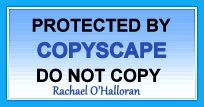
Copyright Notice
© Rachael O'Halloran. All Rights Reserved.
No part of this article may be reproduced without prior permission from the author. Use the following link to refer to this article. Do Not Copy. TYVM
© 2014 Rachael O'Halloran


